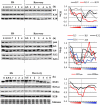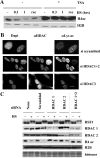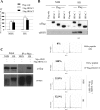Heat-shock factor 1 controls genome-wide acetylation in heat-shocked cells
- PMID: 19793920
- PMCID: PMC2785740
- DOI: 10.1091/mbc.e09-04-0295
Heat-shock factor 1 controls genome-wide acetylation in heat-shocked cells
Abstract
A major regulatory function has been evidenced here for HSF1, the key transcription factor of the heat-shock response, in a large-scale remodeling of the cell epigenome. Indeed, upon heat shock, HSF1, in addition to its well-known transactivating activities, mediates a genome-wide and massive histone deacetylation. Investigating the underlying mechanisms, we show that HSF1 specifically associates with and uses HDAC1 and HDAC2 to trigger this heat-shock-dependent histone deacetylation. This work therefore identifies HSF1 as a master regulator of global chromatin acetylation and reveals a cross-talk between HSF1 and histone deacetylases in the general control of genome organization in response to heat shock.
Figures







Similar articles
-
Transcription factor-dependent chromatin remodeling at heat shock and copper-responsive promoters in Chlamydomonas reinhardtii.Plant Cell. 2011 Jun;23(6):2285-301. doi: 10.1105/tpc.111.085266. Epub 2011 Jun 24. Plant Cell. 2011. PMID: 21705643 Free PMC article.
-
Lysine deacetylases regulate the heat shock response including the age-associated impairment of HSF1.J Mol Biol. 2015 Apr 10;427(7):1644-54. doi: 10.1016/j.jmb.2015.02.010. Epub 2015 Feb 15. J Mol Biol. 2015. PMID: 25688804 Free PMC article.
-
Damaged DNA-binding protein down-regulates epigenetic mark H3K56Ac through histone deacetylase 1 and 2.Mutat Res. 2015 Jun;776:16-23. doi: 10.1016/j.mrfmmm.2015.01.005. Epub 2015 Jan 24. Mutat Res. 2015. PMID: 26255936 Free PMC article.
-
HDAC1 and HDAC2 in mouse oocytes and preimplantation embryos: Specificity versus compensation.Cell Death Differ. 2016 Jul;23(7):1119-27. doi: 10.1038/cdd.2016.31. Epub 2016 Apr 15. Cell Death Differ. 2016. PMID: 27082454 Free PMC article. Review.
-
HSF1 at a glance.J Cell Sci. 2014 Jan 15;127(Pt 2):261-6. doi: 10.1242/jcs.132605. J Cell Sci. 2014. PMID: 24421309 Review.
Cited by
-
Impact of heat shock transcription factor 1 on global gene expression profiles in cells which induce either cytoprotective or pro-apoptotic response following hyperthermia.BMC Genomics. 2013 Jul 8;14:456. doi: 10.1186/1471-2164-14-456. BMC Genomics. 2013. PMID: 23834426 Free PMC article.
-
Heat-mediated reduction of apoptosis in UVB-damaged keratinocytes in vitro and in human skin ex vivo.BMC Dermatol. 2016 May 26;16(1):6. doi: 10.1186/s12895-016-0043-4. BMC Dermatol. 2016. PMID: 27230291 Free PMC article.
-
New Insights into the Regulation of Heterochromatin.Trends Genet. 2016 May;32(5):284-294. doi: 10.1016/j.tig.2016.02.005. Epub 2016 Mar 20. Trends Genet. 2016. PMID: 27005444 Free PMC article. Review.
-
Nuclear stress bodies.Cold Spring Harb Perspect Biol. 2010 Jun;2(6):a000695. doi: 10.1101/cshperspect.a000695. Epub 2010 Apr 28. Cold Spring Harb Perspect Biol. 2010. PMID: 20516127 Free PMC article. Review.
-
Protein folding in the cytoplasm and the heat shock response.Cold Spring Harb Perspect Biol. 2010 Dec;2(12):a004390. doi: 10.1101/cshperspect.a004390. Cold Spring Harb Perspect Biol. 2010. PMID: 21123396 Free PMC article. Review.
References
-
- Biamonti G. Nuclear stress bodies: a heterochromatin affair? Nat. Rev. Mol. Cell Biol. 2004;5:493–498. - PubMed
-
- Boussouar, Rousseaux F., Khochbin S., S. A new insight into male genome reprogramming by histone variants and histone code. Cell Cycle. 2008;7:3499–3502. - PubMed
-
- Chen C., Xie Y., Stevenson M. A., Auron P. E., Calderwood S. K. Heat shock factor 1 represses Ras-induced transcriptional activation of the c-fos gene. J. Biol. Chem. 1997;272:26803–26806. - PubMed
Publication types
MeSH terms
Substances
LinkOut - more resources
Full Text Sources
Miscellaneous

